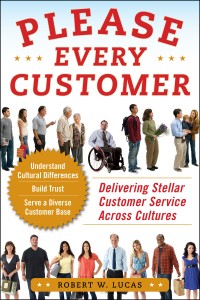Customer Service in a Diverse World
Have you ever experienced a situation in which you were in a place of business and either had a service provider make a derogatory statement to you about another customer or group of customers or overheard two employees sharing negative comments about other customers? In many instances comments or off-the-cuff statements about based on race, religion, ethnicity, gender, disabilities or other diversity factors are not only hurtful but potentially discriminatory. In some instances, such remarks may be grounded in the employee’s deep-seated beliefs or personal values based on their own experiences or education. In others, they may be a result of simple ignorance related to individual customers or groups. Whatever the reason, making comments to or in the presence of other customers is unacceptable and is likely to have negative personal and business results.
I recently experienced an instance in which a small business owner of the barbershop that I’ve patronized for years made a comment that I felt was totally uncalled for and based on personal prejudice. I had commented about a newspaper article regarding a local Hindu group that had recently built a temple in the local area. I commented that I’d be interested in going over to visit the facility and learn more about the religion. My barber remarked, “Why would you want to do that? In my opinion, we should burn all those ragheads and keep them out of our country.” I was shocked since he is obviously ignorant of the topic on which he was commenting and had no concern for how his remarks might be received by others. I shared my feelings with him about what he had said and explained that he seemed to be confusing religions and ethnic groups and that in either case, his remarks were out of line and potentially offensive. His response was, “I fought in Viet Nam and I don’t trust any of these radicals.” The result of this conversation is that I now patronize a different hairstylist and have shared this story dozens of times with others.
In today’s world where people are so mobile, the economy is globally intertwined and information about other groups is so readily available through various channels, it is hard to believe that there are people who have not taken the time to discover the benefits of embracing diversity and still harbor such prejudice. Service providers who remain content to take actions such as the one I experienced not only guarantee lost business for their organization but also jeopardize their personal and professional reputation.
As I discuss in my latest book (Please Every Customer: Delivering Stellar Service Across Cultures), “Not only do today’s service providers have to be concerned with job knowledge, skills, and professional standards, but they also have to be cognizant of the values, beliefs, social mores, expectations, needs, and preferences of customers…They are the “face” of the organization and need all the knowledge and skills they get in the order to provide stellar customer service.”
For ideas and strategies on effectively serving customers in a multicultural and otherwise diverse world, check out the books Please Every Customer: Delivering Stellar Customer Service Across Cultures and Customer Service Skills for Success.


